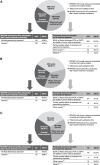Interpretation of SD-OCT imaging data in real-life conditions versus standardized reading centre analysis in eyes with diabetic macular oedema or macular oedema secondary to retinal vein occlusion: 24-month follow-up of the ORCA study
- PMID: 39294392
- PMCID: PMC11807050
- DOI: 10.1007/s00417-024-06579-7
Interpretation of SD-OCT imaging data in real-life conditions versus standardized reading centre analysis in eyes with diabetic macular oedema or macular oedema secondary to retinal vein occlusion: 24-month follow-up of the ORCA study
Abstract
Purpose: As part of the prospective, non-interventional OCEAN study, the ORCA module evaluated physicians' spectral domain optical coherence tomography (SD-OCT) image interpretations in the treatment of diabetic macular oedema (DME) or macular oedema (ME) secondary to retinal vein occlusion (RVO).
Methods: Presence of intraretinal fluid (IRF) and/or subretinal fluid (SRF) was evaluated independently by physicians and reading centres (RCs) on 1612 SD-OCT scans of 133 patients diagnosed with either DME or ME secondary to RVO. Agreement between physicians and RCs was calculated for both cohorts individually and as a combined ME cohort. Physicians' treatment decisions were analysed related to the results of the OCT-evaluations.
Results: For the combined ME cohort, presence of IRF/SRF was recorded by RCs in 792/1612 (49.1%) visits and by physicians in 852/1612 (52.9%) visits, with an agreement regarding presence or absence of foveal fluid in 70.4% of cases. In 64.4% (510/792) of visits with RC-detected foveal IRF and/or SRF no injection was given. In 30.3% of these visits with foveal fluid no reason was identified for a 'watch and wait' approach indicating possible undertreatment. BCVA deterioration was seen in a quarter of these eyes at the following visit.
Conclusion: Despite good agreement between physicians and RCs to recognize SRF and IRF, our data indicate that omitting injections despite foveal involvement of fluid is frequent in routine clinical practice. This may put patients at risk of undertreatment, which may negatively impact real-life BCVA outcomes.
Trial registration: www.
Clinicaltrials: gov , identifier NCT02194803.
Keywords: Anti-VEGF; Diabetic macular oedema (DME); Macular oedema (ME); Retinal vein occlusion (RVO); Spectral Domain Optical coherence tomography (SD-OCT).
© 2024. The Author(s).
Conflict of interest statement
Declarations. Ethical approval: The OCEAN study was approved by the ethics committee of the Eberhard-Karls-University, Tuebingen, Germany. All procedures performed in studies involving human participants were in accordance with the ethical standards of the institutional and/or national research committee and with the 1964 Helsinki declaration and its later amendments or comparable ethical standards. Informed consent was obtained from all individual participants included in the study. Separate informed consent was required for patients to be included in the ORCA module. Consent to participate: Every patient was informed by the treating physician about the key objectives as well as the type and scope of the documentation. Eligible patients could only be included in the study after providing written informed consent, or, if incapable of doing so, after such consent had been provided by a legally acceptable representative of the patient. Consent for publication: Patients signed informed consent regarding publishing their data. Conflicts of interests: Georg Spital received personal fees from Bayer Healthcare, Novartis, Roche, OD-OS, and Allergan Pharma and grants from Amgen, Iveric Bio, Roche, Kodiak, Novartis, Novo-Nordisk, Gyroscope, Alexion. Steffen Schmitz-Valckenberg received contracts and personal fees for consultancy from Novartis as part of the submitted work. Outside the submitted work, he received grants or contracts from AlphaRET, Apellis, Bayer, Bioeq/Formycon, Carl Zeiss MediTec, Katairo, Kubota Vision, Novartis, Pixium, Roche/Genentech, SparingVision; Consulting fees from Apellis, Bioeq/Formycon, Galimedix, Novartis, Oxurion, Roche/Genentech; and nonfinancial support from Carl Zeiss Meditec and Heidelberg Engineering, outside the submitted work; being co-founder of the STZ GRADE Reading Centre. Bettina Müller and Erika Liczenczias are employees of Novartis. Petrus Chang received grants from Heidelberg Engineering, Novartis, ZeissMeditec. Britta Heimes-Bussmann received grants Amgen, Iveric Bio, Roche, Kodiak, Novartis, Novo-Nordisk, Gyroscope and personal fees von Bayer. Focke Ziemssen received research grants from Bayer, BMBF, Clearside, DFG, Kodiak, Iveric, Ophtea, Novartis, Regeneron, consulting fees from Alimera Sciences, Allergan/Abbvie, Bayer, Boehringer-Ingelheim, Novartis, NovoNordisk, MSD, Oxurion, Roche/Genentech, and fees as speaker from Alimera, Allergan/Abbvie, Bayer, BDI, CME Health, Gerling, Novartis, ODOS, Roche. Sandra Liakopoulos received grants from Novartis, personal fees from Novartis, Heidelberg Engineering, Carl Zeiss Meditec, Allergan/Abbvie, Bayer, Apellis, and consulting fees from Novartis, Bayer, Apellis and Allergan.
Figures


References
Publication types
MeSH terms
Substances
Associated data
LinkOut - more resources
Full Text Sources
Medical
Research Materials
Miscellaneous

